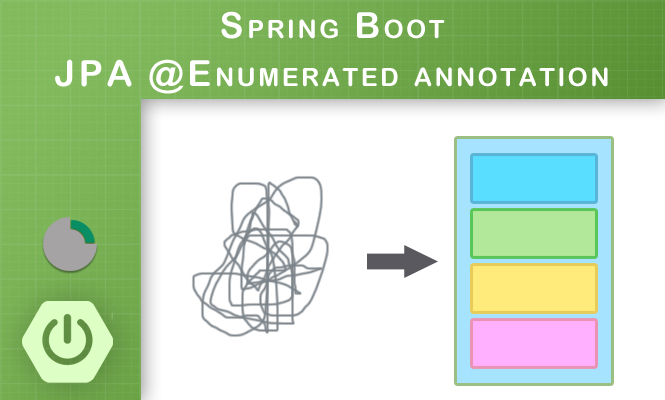In the world of Spring Boot applications, data modeling plays a crucial role and JPA @Enumerated is here for that. JPA provides an elegant way to map Java classes to database tables, while the @Enumerated annotation empowers you to seamlessly represent enumerations as database columns. This article delves into the intricacies of JPA Enumerated, offering practical Spring Boot code examples to guide your data modeling journey.
JPA @Enumerated Annotation: options and strategies
The @Enumerated annotation enables you to specify how an enum type is persisted in the database. Spring Boot supports two primary strategies:
- EnumType.STRING: Stores the enum’s name as a string in the database column.
@Entity
public class User {
@Id
@GeneratedValue
private Long id;
@Enumerated(EnumType.STRING)
private UserRole role;
// ... other fields and methods
}
enum UserRole {
ADMIN, USER, EDITOR
}
- EnumType.ORDINAL: Stores the enum’s ordinal value (integer index) in the database column.
@Entity
public class Task {
@Id
@GeneratedValue
private Long id;
@Enumerated(EnumType.ORDINAL)
private TaskStatus status;
// ... other fields and methods
}
enum TaskStatus {
PENDING, IN_PROGRESS, COMPLETED
}
Choosing the right strategy
Selecting the appropriate strategy involves understanding their trade-offs:
- EnumType.STRING: Offers clarity and readability, especially for enums with non-sequential ordinals. However, it requires extra space in the database and limits queries using ordinal comparisons.
- EnumType.ORDINAL: Saves space and allows ordinal-based queries. However, ordinal values can change if you modify the enum order, potentially breaking existing data and logic.
Consider these factors when deciding:
- Enum size: Larger enums benefit from readability gains of STRING.
- Query needs: If frequent ordinal-based queries are necessary, ORDINAL might be suitable.
- Future changes: If enums are likely to evolve, STRING provides more flexibility.
Customizing JPA @Enumerated for advanced scenarios
You can further customize the behavior of @Enumerated using its attributes:
columnDefinition: Specify the database column definition (e.g., size, constraints).fieldName: Override the default column name generated from the enum name.
@Entity
public class Product {
@Id
@GeneratedValue
private Long id;
@Enumerated(EnumType.STRING, columnDefinition = "VARCHAR(20)")
private ProductCategory category;
// ... other fields and methods
}
enum ProductCategory {
ELECTRONICS, APPAREL, GROCERIES
}
Putting it all together: Spring Boot code examples
Let’s see how the concepts translate into practical use cases:
Scenario 1: User Roles with Clear Descriptions:
@Entity
public class User {
// ... other fields
@Enumerated(EnumType.STRING)
@Column(name = "role_description")
private UserRoleDescription roleDescription;
}
enum UserRoleDescription {
ADMIN("Manages users and permissions."),
USER("Standard user accessing basic features."),
EDITOR("Creates and edits content.")
}
Scenario 2: Task Priorities with Efficient Storage:
@Entity
public class Task {
// ... other fields
@Enumerated(EnumType.ORDINAL)
@Column(name = "priority_level")
private TaskPriority level;
}
enum TaskPriority {
LOW(1), MEDIUM(2), HIGH(3)
}
Beyond the basics: additional considerations
- Custom Enum Mappings: Use a converter if you need more complex mapping logic between enums and database values.
- Third-Party Libraries: Explore libraries like Hibernate Enums for advanced enum handling and customizability.
Conclusion: JPA Enumerated – a powerful tool for your Spring Boot data model
By understanding the concepts and strategies provided, you can leverage JPA @Enumerated effectively in your Spring Boot applications. Remember to choose the appropriate strategy based on your specific needs, customize it when required, and explore advanced techniques for even greater flexibility in your data modeling endeavors.

